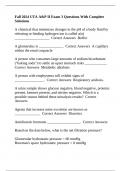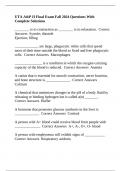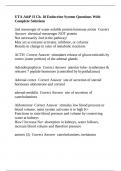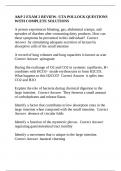A&P
University Of Texas - Arlington
All 13 results
Sort by
Fall 2024 UTA A&P II Exam 3 Questions With Complete Solutions
UTA A&P II Final Exam Fall 2024 Questions With Complete Solutions
A&P University Of Texas - Arlington -UTA A&P II Ch. 18 Endocrine System Questions With Complete Solutions
A&P University Of Texas - Arlington -A&P 2 EXAM 2 REVIEW- UTA POLLOCK QUESTIONS WITH COMPLETE SOLUTIONS
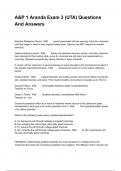
-
A&P 1 Aranda Exam 3 (UTA) Questions And Answers
- Exam (elaborations) • 8 pages • 2024
-
- $9.89
- + learn more
Absolute Refractory Period - ANS period associated with the opening of the Na+ channels until they begin to reset to their original resting state. (Neuron can NOT respond to another stimulus) relative refractory period - ANS follows the absolute refractory period, most Na+ channels have returned to their resting state, some K+ channels are still open, and repolarization is occurring. (Requires exceptionally strong stimulus to open channels) A neuron will not respond to a se...
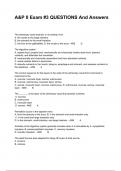
-
A&P II Exam #3 QUESTIONS And Answers
- Exam (elaborations) • 18 pages • 2024
-
- $10.39
- + learn more
The alimentary canal extends, in its entirety, from A. the mouth to the large intestine. B. the stomach to the small intestine. C. the liver to the gallbladder. D. the mouth to the anus - ANS D The digestive system A. ingests food, propels food, mechanically and chemically breaks down food, absorbs nutrients, and defecates the remainder. B. mechanically and chemically assembles food from absorbed nutrients. C. sends cellular debris to lysosomes. D. absorbs nutrients in t...
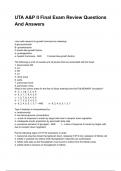
-
UTA A&P II Final Exam Review Questions And Answers
- Exam (elaborations) • 19 pages • 2024
-
- $10.39
- + learn more
Liver cells respond to growth hormones by releasing: A-glucocorticoids B- gonadotropins C-insulin-like-growth factors d- prostaglandins e- hepatic hormones - ANS C-insulin-like-growth factors The following is a list of vessels and structures that are associated with the heart. 1. blood enters RA 2. LA 3. RV 4. LV 5. Vena Cava 6. aorta 7. pulmonary trunk 8. pulmonary veins What is the correct order for the flow of blood entering from the PULMONARY circulation? A - 5, 1,...
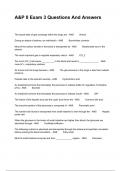
-
A&P II Exam 3 Questions And Answers
- Exam (elaborations) • 11 pages • 2024
-
- $9.89
- + learn more
The actual sites of gas exchange within the lungs are - ANS Alveoli During an attack of asthma, an individual's - ANS Bronchioles constrict Most of the carbon dioxide in the blood is transported as - ANS Bicarbonate ions in the plasma The most important gas to regulate respiratory rate is - ANS CO_2 Too much CO_2 will cause __________ in the blood and result in _______________. - ANS more H^+; respiratory acidosis Air moves into the lungs b...
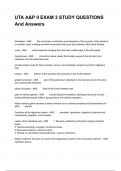
-
UTA A&P II EXAM 3 STUDY QUESTIONS And Answers
- Exam (elaborations) • 10 pages • 2024
-
- $9.89
- + learn more
Peristalsis - ANS the involuntary constriction and relaxation of the muscles of the intestine or another canal, creating wavelike movements that push the contents of the canal forward. uvula - ANS small projection hanging from the back middle edge of the soft palate mesenteries - ANS connective tissue sheets that loosely suspend the stomach and intestines from the abdominal wall. provide access route for blood vessels, nerves, and lymphatic vessels to and from d...
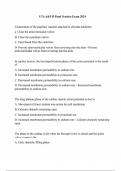
-
UTA A&P II Final Practice Exam 2024
- Exam (elaborations) • 24 pages • 2024
-
- $12.00
- + learn more
Contractions of the papillary muscles attached to chordae tendineae a. Close the atrioventricular valves B. Close the semilunar valves C. Eject blood from the ventricles D. Prevent atrioventricular valves from reversing into the atria - Prevent atrioventricular valves from reversing into the atria In cardiac muscle, the fast depolarization phase of the action potential is the result of A. Increased membrane permeability to sodium ions B. Increased membrane permeability to potassium ions ...
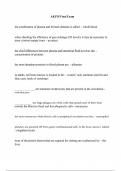
-
A&P II Final Exam
- Exam (elaborations) • 5 pages • 2024
-
- $8.00
- + learn more
the combination of plasma and formed elements is called: - whole blood when checking the efficiency of gas exchange (O2 levels), it may be necessary to draw a blood sample from: - an artery the chief differences between plasma and interstitial fluid involves the: - concentration of proteins the most abundant proteins in blood plasma are: - albumins in adults, red bone marrow is located in the: - A and C only (sternum and ribs and iliac crest, body of vertebrae) ______________ are immature e...
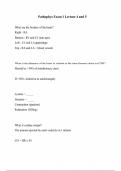
-
Pathophys Exam 1 Lecture 4 and 5
- Exam (elaborations) • 70 pages • 2024
-
- $13.00
- + learn more
What are the borders of the heart? Right - RA Bottom - RV and LV near apex Left - LV and LA appendage Top - RA and LA + blood vessels What is the diameter of the heart in relation to the intra-thoracic chest on CXR? Should be <50% of intrathoracic chest If >50%, looked at as cardiomegaly Systole = _____ Diastole = _____ Contraction (ejection) Relaxation (Filling) What is cardiac output? The amount ejected by each ventricle in 1 minute CO = HR x SV What is the typical cardiac...

That summary you just bought made someone very happy. Also get paid weekly? Sell your study resources on Stuvia! Discover all about earning on Stuvia

